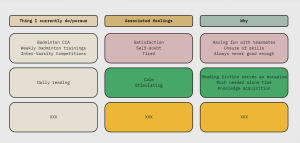With the semester already well underway, many of you might already be asking yourself questions such as, “What’s next?” Despite the gruelling semester and endless hustles, it seems that many are choosing to take on more work and look ahead for opportunities to spend their summer productively. This is a crucial time for you to pause and consider what your top priorities are, rather than charge head-first alongside your hustling peers. Through finding yourself and understanding your own motivations, you can best plan for your next steps, and meaningfully align them with your goals. In this article, we will share with you 6 steps on how you could do so – read on!
1. Catch a breath
Slow down, pause, and take a step back for a moment. Instead of looking at others’ progress and lives, pay attention to your own current direction. Rather than evaluate, we appeal to you to simply observe yourself first.
Reflect on your frequent practices, your current commitments and investments, as well as the main things that you are actively working towards. What are the key emotions linked to these practices or goals of yours? Now, take a step back to observe. Is your list of commitments long? Are there items that you feel more excited about, or items that you clearly do not look forward to?
Set aside time to properly consider what your motivations are for the commitments and goals that you currently pursue. It might be worth dropping the ones that turn out to not hold much value for you, allowing you to focus your energy on those that you realise should be prioritised more greatly. You could even take a few days to ruminate, and sleep on this; more than ‘catching a breath’, this stage serves as a crucial way to frame your mindset, and prepare you for a more satisfactory and efficient journey moving forward.
Slow down to observe your fast-paced life (IMG: Source)
2. Dig deep
After catching a breath, it is imperative that you make use of this new clarity in headspace to reflect on your innermost thoughts. This might sound slightly daunting, especially due to the energy and soul-searching it requires. However, we promise that it would be worth your time!
IMG: source
When digging deep, first consider your current position, and compare yourself to you (Gloveworx), rather than looking at others. Determine where you are, so that you can decide where you hope to be. We recommend starting off by asking yourself abstract questions (such as those mentioned in 1. Catch a breath), then moving into more tangible ones. For instance, start off by thinking about which emotions are most salient in your current life, what motivations serve as the main driving force for what you currently pursue, and when you feel the best about yourself (and perhaps when you do not).
After some contemplation, you can begin to sieve out more concrete insights, such as by asking yourself about the frequency with which you feel the best about the activity that you are participating in, and exactly which aspects of the activity make you feel this way. Consider doing a mapping: categorising your current commitments (e.g. necessary, recreational, social), breaking them down into specific parts to be bucketed under distinct themes (e.g. emotions, goals, degree of necessity), then reflecting on your key takeaways. Rather than focus on the visceral emotions you derive from activities, try to dig deep by picking out the root of your feelings and matching them to specific elements that explain them.
Example of a mapping that you can do – enhance this by adding categorisation and takeaways
If you are contemplating between different life plans going forward, it is also useful to weigh the pros and cons of each option. The previous mapping exercise could inform this process, and allow you to think about advantages and disadvantages that go beyond the obvious or tangible, paying attention to your subjective experiences and the resulting qualitative data as well.
3. Synthesise takeaways from the ongoing semester
We find that one great way to develop your priorities and direction is to reflect on your experiences, building upon your learnings and relationships. Synthesising learning points from your studies and experiences is a skill that enhances your ‘confidence to use knowledge from one area of study to [inspire new ideas and] question information in other areas of learning’ (Macmillan Education). We encourage you to apply your takeaways from your current and past experiences, and apply them.
IMG: source
Seeking out connections between things that you have learnt (both in your field of study and your general life) could highlight overlaps and important findings that would enable you to make more informed, holistic decisions. Build on what you have gained expertise in, or skills that you are currently honing. Lay out these insights to clarify what you might want to pursue moving forward.
To explicate this suggestion, here is an example: Peter, a Y2 student majoring in Communications and New Media, is currently taking a coding module. He has deep dived into machine learning and has learnt more about computer science, developing his coding skills extensively. While his new knowledge and expertise do not have direct links to his main field of study, Peter realises that feelings of excitement and satisfaction are closely linked to his experience in this coding module. As such, he draws connections between his major and his learnings from the coding module, arriving at the decision to explore the field of UX/UI design (which combines knowledge from both areas). For the summer holidays, he hence hopes to take up an online course that delves into user experience design.
4. Write or visualise
Writing out your reflections could help with finding meaning in your everyday experiences, possibly refreshing your perspective on your daily observations as well (Career Wise). Visualisations, in the form of drawings, mind maps or other forms of visual expression, can also help you flesh out your thoughts to greater detail.
This would benefit your execution of the aforementioned suggestions. Nevertheless, if the suggestions prove too extensive to carry out given your current capacity, consider a simple exercise such as journaling. Frequent journaling can provide you with an outlet to pen down your thoughts, including personal reflections that may not come up in your daily conversations. Through this thoughtful process, you could get to know yourself better; reading past entries could help you sieve out useful insights about yourself and your developing goals too. Here are 32 journal prompts you could adopt for some self-discovery. Alternatively, you could simply revert to the typical style of journaling by penning down your daily encounters and emotions too!
Make journaling fun by making it an aesthetic process too (IMG: Source)
- Look to those who you respect
Now, you can compare yourself to others. Wait – we don’t mean it literally! With the resources and self-reflection that you have extensively engaged in, we think that you might be ready to look to external parties again. According to Festinger’s social comparison theory, ‘comparing ourselves is necessary to find better answers to the timeless question about who we are’ (source).
One could stand to gain much insight and inspiration by listening to the stories and opinions of those who they respect dearly: teachers, experienced peers, parents, mentors, etc. By ‘comparing’ your current way of thinking to those with opinions that you value, you could get a glimpse into new perspectives and ideas that could allow you to rethink your path moving forward. Oftentimes, looking at your life with a pair of fresh eyes (a.k.a. through someone else’s eyes) could be the final key to taking a meaningful step forward.
Arrange a sit-down (e.g. with a trusted mentor/adult) if you need a conducive space and time to properly think through your plans. However, considering that it is a busy period, don’t stress over it. Even if fleeting, your engagement with these people could still prove highly effective if you are able to ask direct and concise questions. You could also consider weaving in pertinent questions into casual conversations, when you happen to bump into someone whom you wish to gain insights from.
IMG: Source
6. Consider your own mental capacity
We find this to be one of the most crucial steps to take when finding yourself amidst the hustle. Mental (and physical) health matters the most, for without a healthy mind (and body), you would find yourself struggling to proceed with your daily functions, much less work towards larger goals.
Ask yourself: Is your body telling you that you deserve a much-needed break this summer? Are you feeling tired, burnt out, or overwhelmed? Recall what you have done this semester – for instance, think about whether you have experienced high amounts of stress, or whether you need a prolonged break to reignite certain passions that diminished as a result of stress. If you find that you lack a clear headspace to think about or work on your future endeavours, know that it is alright to have some respite from the university hustle. The length of break required could differ for everyone – understanding yourself and your mental needs would allow you to carve out an appropriate amount of time to rest and recuperate. Only after your mental capacity has been regenerated, then can you return to plan out your next steps with a clear mind!
University life can be strenuous if you think about it as a never-ending race with your peers. Instead of rushing to an arbitrary finish line, slow down to run your own race – compare yourself to yourself, and find yourself amidst the hustle. This way, we think that you can best propel yourself towards decisions that would suit your personal goals and preferences. Do you have any additional tips that you wish to share? Post them on Instagram and tag us @nusresidentiallife – we will be sure to repost them!





